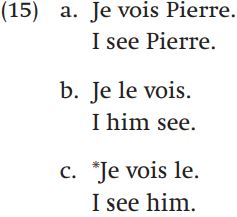

Grammar


Tenses


Present

Present Simple

Present Continuous

Present Perfect

Present Perfect Continuous


Past

Past Simple

Past Continuous

Past Perfect

Past Perfect Continuous


Future

Future Simple

Future Continuous

Future Perfect

Future Perfect Continuous


Parts Of Speech


Nouns

Countable and uncountable nouns

Verbal nouns

Singular and Plural nouns

Proper nouns

Nouns gender

Nouns definition

Concrete nouns

Abstract nouns

Common nouns

Collective nouns

Definition Of Nouns

Animate and Inanimate nouns

Nouns


Verbs

Stative and dynamic verbs

Finite and nonfinite verbs

To be verbs

Transitive and intransitive verbs

Auxiliary verbs

Modal verbs

Regular and irregular verbs

Action verbs

Verbs


Adverbs

Relative adverbs

Interrogative adverbs

Adverbs of time

Adverbs of place

Adverbs of reason

Adverbs of quantity

Adverbs of manner

Adverbs of frequency

Adverbs of affirmation

Adverbs


Adjectives

Quantitative adjective

Proper adjective

Possessive adjective

Numeral adjective

Interrogative adjective

Distributive adjective

Descriptive adjective

Demonstrative adjective


Pronouns

Subject pronoun

Relative pronoun

Reflexive pronoun

Reciprocal pronoun

Possessive pronoun

Personal pronoun

Interrogative pronoun

Indefinite pronoun

Emphatic pronoun

Distributive pronoun

Demonstrative pronoun

Pronouns


Pre Position


Preposition by function

Time preposition

Reason preposition

Possession preposition

Place preposition

Phrases preposition

Origin preposition

Measure preposition

Direction preposition

Contrast preposition

Agent preposition


Preposition by construction

Simple preposition

Phrase preposition

Double preposition

Compound preposition

prepositions


Conjunctions

Subordinating conjunction

Correlative conjunction

Coordinating conjunction

Conjunctive adverbs

conjunctions


Interjections

Express calling interjection

Phrases

Sentences


Grammar Rules

Passive and Active

Preference

Requests and offers

wishes

Be used to

Some and any

Could have done

Describing people

Giving advices

Possession

Comparative and superlative

Giving Reason

Making Suggestions

Apologizing

Forming questions

Since and for

Directions

Obligation

Adverbials

invitation

Articles

Imaginary condition

Zero conditional

First conditional

Second conditional

Third conditional

Reported speech

Demonstratives

Determiners


Linguistics

Phonetics

Phonology

Linguistics fields

Syntax

Morphology

Semantics

pragmatics

History

Writing

Grammar

Phonetics and Phonology

Semiotics


Reading Comprehension

Elementary

Intermediate

Advanced


Teaching Methods

Teaching Strategies

Assessment
Clitics
المؤلف:
Rochelle Lieber
المصدر:
Introducing Morphology
الجزء والصفحة:
150-8
25-1-2022
1828
Clitics
One of these borderland creatures is something that linguists call a clitic. Clitics are small grammatical elements that cannot occur independently and therefore cannot really be called free morphemes. But they are not exactly like affixes either. In terms of their phonology, they do not bear stress, and they form a single phonological word with a neighboring word, which we will call the host of the clitic. However, they are not as closely bound to their host as inflectional affixes are; frequently they are not very selective about the category of their hosts. Those clitics that come before their hosts are called proclitics, those that come after their hosts enclitics.
Two types of clitics are often distinguished: simple clitics and special clitics. Anderson (2005: 10) defines simple clitics as “unaccented variants of free morphemes, which may be phonologically reduced and subordinated to a neighboring word. In terms of their syntax, though, they appear in the same position as one that can be occupied by the corresponding free word.” In English, forms like -ll or -d, as in the sentences in (13), are simple clitics:

In these sentences, -ll and -d are contracted forms of the auxiliaries will and would, and they occur just where the independent words would occur – following the subject I and before the main verb. Like affixes, they are pronounced as part of the preceding word. Unlike affixes, they do not select a specific category of base and change its category or add grammatical information to it. Contracted forms like -ll or -d in English will attach to any sort of word that precedes them, regardless of category:

In (14a) -ll is cliticized to the adverb there, and in (14b) -d is cliticized to the verb know.
Special clitics are phonologically dependent on a host, as simple clitics are, but they are not reduced forms of independent words. Compare the example in (15) from French:

Although the object pronoun le in French is written as a separate word, it is phonologically dependent on the verb to its right; in other words, the object pronoun and the verb are pronounced together as a single phonological word. There is no independent word that means ‘him’ in French. So le and the other object pronoun forms in French are special clitics.
Clitics are of interest both to syntacticians and to morphologists precisely because they have characteristics both of bound morphemes and of syntactic units. Like bound morphemes, they cannot stand on their own. But unlike morphemes, they are typically unselective of their hosts and have their own independent functions in syntactic phrases.
 الاكثر قراءة في Morphology
الاكثر قراءة في Morphology
 اخر الاخبار
اخر الاخبار
اخبار العتبة العباسية المقدسة

الآخبار الصحية















 قسم الشؤون الفكرية يصدر كتاباً يوثق تاريخ السدانة في العتبة العباسية المقدسة
قسم الشؤون الفكرية يصدر كتاباً يوثق تاريخ السدانة في العتبة العباسية المقدسة "المهمة".. إصدار قصصي يوثّق القصص الفائزة في مسابقة فتوى الدفاع المقدسة للقصة القصيرة
"المهمة".. إصدار قصصي يوثّق القصص الفائزة في مسابقة فتوى الدفاع المقدسة للقصة القصيرة (نوافذ).. إصدار أدبي يوثق القصص الفائزة في مسابقة الإمام العسكري (عليه السلام)
(نوافذ).. إصدار أدبي يوثق القصص الفائزة في مسابقة الإمام العسكري (عليه السلام)


















